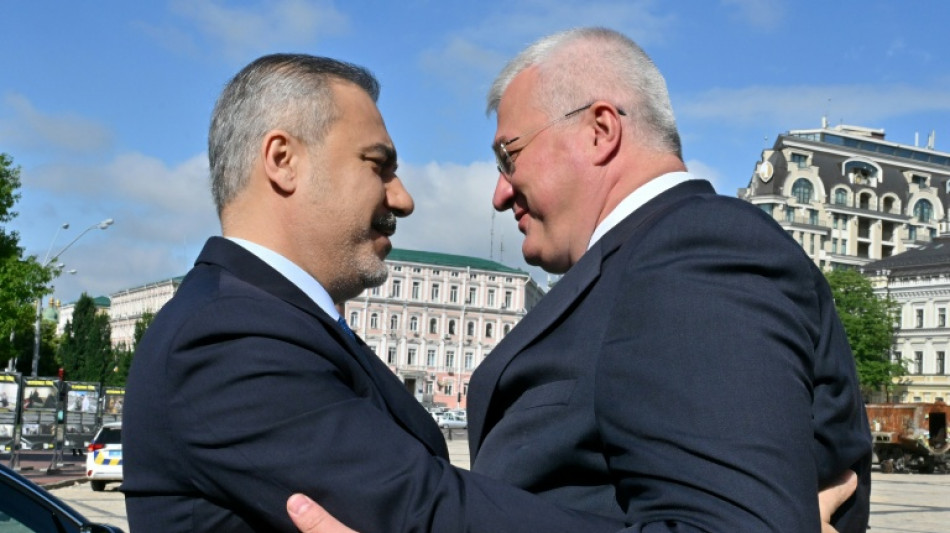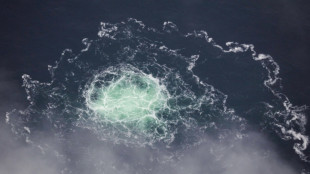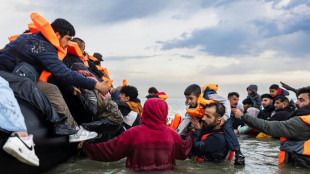
| RBGPF | 0% | 73.27 | $ | |
| CMSC | 0.21% | 23.49 | $ | |
| RELX | -1.05% | 48.185 | $ | |
| SCS | -0.37% | 16.12 | $ | |
| BP | -0.09% | 33.85 | $ | |
| NGG | -0.97% | 71.39 | $ | |
| BTI | 0.26% | 59.165 | $ | |
| GSK | 0.52% | 40.28 | $ | |
| RIO | 0.64% | 61.01 | $ | |
| RYCEF | 1.36% | 13.94 | $ | |
| CMSD | -0.06% | 23.675 | $ | |
| AZN | 0.18% | 80.665 | $ | |
| BCC | -0.51% | 84.07 | $ | |
| BCE | -0.78% | 25.54 | $ | |
| JRI | -0.04% | 13.325 | $ | |
| VOD | -0.76% | 11.81 | $ |

Turkey proposes to host Trump-Putin-Zelensky summit
Turkey on Friday proposed hosting a summit with the leaders of Russia, Ukraine and the United States as it strives to broker an elusive deal to end Russia's three-year invasion -- an invitation swiftly dismissed by the Kremlin.
Moscow said it was sending a team of negotiators to Istanbul for a second round of direct talks with Ukraine on Monday -- though Kyiv has yet to confirm if it will attend.
Turkish President Recep Tayyip Erdogan, who has fostered warm relations with both Volodymyr Zelensky and Vladimir Putin, has become a key mediator amid Donald Trump's push for a deal to end the over three-year war.
"We sincerely think that it is possible to cap the first and second direct Istanbul talks with a meeting between Mr. Trump, Mr. Putin and Mr. Zelensky, under the direction of Mr. Erdogan," Turkey's Foreign Minister Hakan Fidan said during a visit to Kyiv.
The Kremlin pushed back against the idea of a face-to-face meeting involving Putin and Zelensky.
"First, results must be achieved through direct negotiations between the two countries," Kremlin spokesman Dmitry Peskov told reporters.
Fidan met Ukraine's Foreign Minister Andriy Sybiga in Kyiv and was due to meet Zelensky later in the day.
He held talks with Putin in Moscow earlier this week.
Ukraine has said it is open to further negotiations, but has not confirmed it will be in Istanbul on Monday.
At talks in Istanbul on May 16 -- the first in over three years -- the sides agree to swap documents outlining possible roadmaps to peace.
The Kremlin repeated Friday that it would hand over its version at the talks on Monday, but Kyiv is pressuring Moscow to send a copy in advance.
- 'Disregard for diplomacy' -
Ukraine has for more than two months been urging Russia to agree to a full, unconditional and immediate 30-day ceasefire -- an idea first proposed by Trump.
Putin has repeatedly rejected those calls, despite pressure from Washington and Europe, while the Russian army has intensified its advances in eastern Ukraine.
He has said that a ceasefire is possible as a result of negotiations, but that talks should focus on the "root causes" of the war.
Moscow typically uses that language to refer to a mix of sweeping demands that have at times included limiting Ukraine's military, banning it from joining NATO, massive territorial concessions and the toppling of Zelensky.
Kyiv and the West have rejected those calls and cast Russia's assault as nothing but an imperial-style land grab.
Russia's invasion in February 2022 triggered the biggest European conflict since World War II.
Tens of thousands have been killed, swathes of eastern and southern Ukraine destroyed and millions forced to flee their homes.
Trump has been growing increasingly frustrated at both Zelensky and Putin for not having struck a deal yet.
At a UN Security Council meeting Thursday a US diplomat reaffirmed that Washington could pull back from peace efforts if it does not see progress soon.
Despite the sides having held their first peace talks in more than three years, there has been little sign of movement towards a possible compromise agreement.
At the talks earlier in May, Ukraine said Russia threatened to accelerate its ground offensive into new regions and made a host of maximalist demands, including that Kyiv cede territory still under its control.
Along with its European allies, Ukraine has been ramping up pressure on Trump to hit Moscow with fresh sanctions -- a step he has so far not taken.
"Talks of pauses in pressure or easing of sanctions are perceived in Moscow as a political victory –- and only encourage further attacks and continued disregard for diplomacy," Zelensky said Friday on social media.
Russia has meanwhile been pressing its advance on the battlefield, with its forces on Friday claiming to have captured another village in the northeastern Kharkiv region.
S.Monti--GdR


